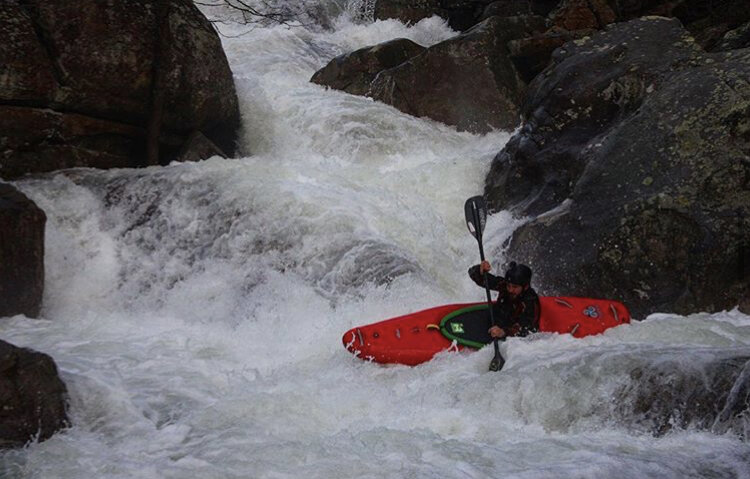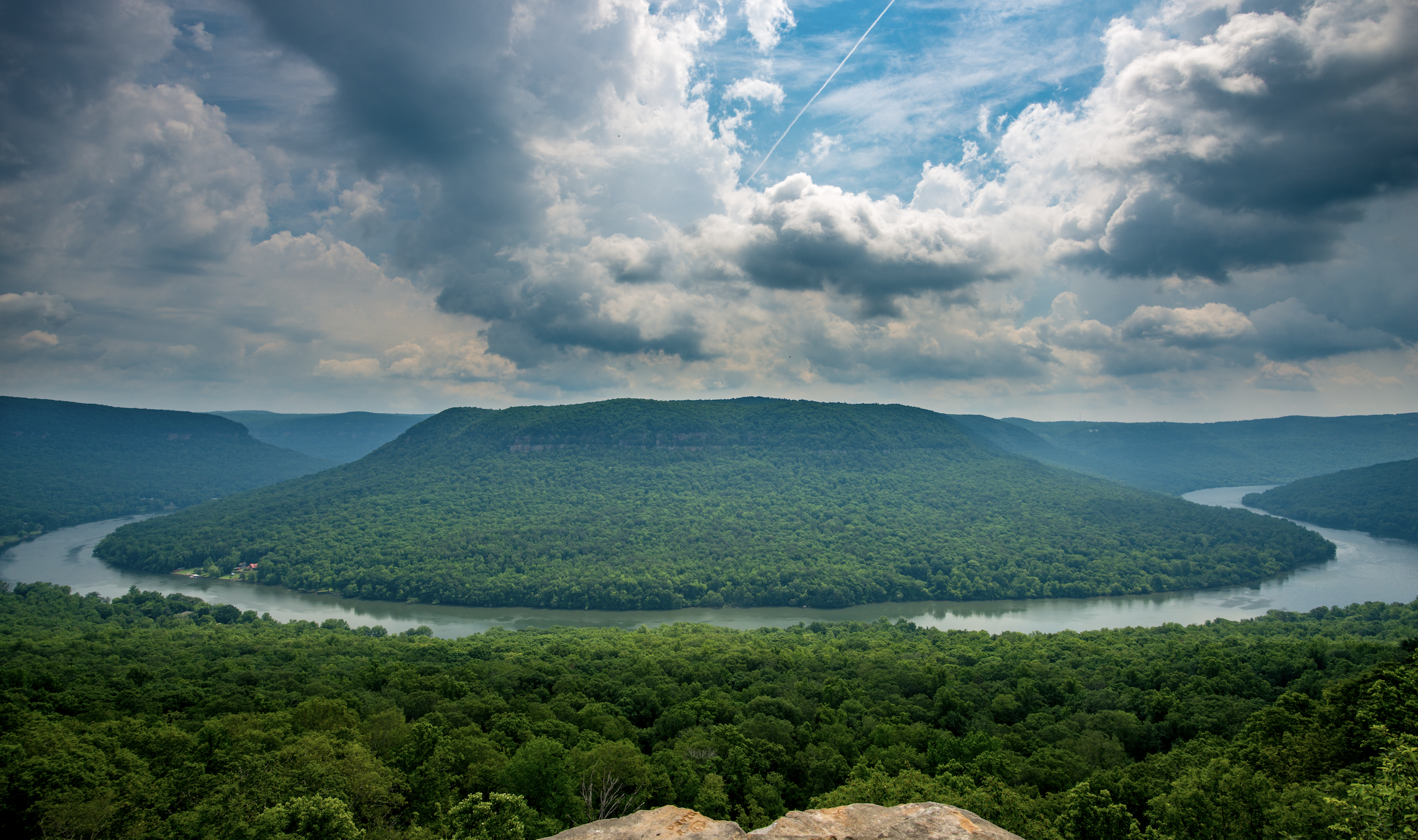By Eliot Berz
Five miles after the Tennessee River flows through downtown Chattanooga, the river is enveloped by Signal and Elder Mountains creating a picturesque canyon. 18,000 of the 27,000- acres that make up the Tennessee River Gorge are currently protected by either the Tennessee River Gorge Trust, Prentice Cooper State Forest, and the Tennessee Valley Authority. Among these conserved properties, there is an abundance of opportunities to get outside and explore this natural treasure.
A hiker enjoying Ritchie Hollow Trail
The River Gorge has no shortage of trails ranging from moderate hiking to advanced single-track mountain biking trails. TRGT maintains two public hiking trails: the Ritchie Hollow Trail and Pot Point Nature Loop. The Ritchie Hollow Trail is a moderately strenuous 2.7-mile out and back hike (5.4 miles roundtrip) with 1,200 feet of elevation gain. The unique draw of this popular trail is the connection between the Tennessee River and the Cumberland Trail on top of the Prentice Cooper State Forest. A old, narrow logging road bed intended for mules now provides a steep 1/4 miles climb up to a striking 30- foot waterfall named Blowing Wind Falls. Hikers will also see historic moonshine still sites, rhododendron and mountain laurel patches, and mature hemlock trees. Branching off of the same trailhead and parking area as the Ritchie Hollow Trail is the Pot Point Nature Loop. This 4.1-mile loop brings hikers up the side of the mountain to a magnificent boulder field, then back down and along the river. For more information about hiking these trails, visit this link. Prentice Cooper, TRGT’s partner and neighbor, also has an array of nearby trails including the Cumberland Trail (Tennessee’s longest trail system). This state forest also contains a variety of scenic overlooks, such as Snoopers Rock and Pot Point, and includes the impressive Suck Creek and Mullens Creek. Across the river, Racoon Mountain is another top-notch hiking and mountain biking destination in the River Gorge. As anyone that has been here would agree, these are must see places if you live in or visit the Chattanooga area!
The gorge’s recreation opportunities offer options for the skilled and novice adventurers as long as they are prepared for the trip. Here are a few pointers to help make your trip a safe and pleasurable one. Always remember to bring a map with you on your trip (maps can be printed or downloaded here). Another safe practice that often gets overlooked is letting a friend or family member know where you will be hiking. To be prepared if things don’t go as planned, always remember to bring a first aid kit, extra water, a cell phone, and a flashlight if you are hiking in the afternoon. Most importantly, know your limits and abilities before you get on the trail. In order to have a fun and safe day, you should understand exactly what you’re getting into before your shoes hit the trail.
TRGT’s Williams Island Blueway Campsite
There’s much more than hiking; the River Gorge has multiple campsites throughout the canyon. Williams Island sits at the entrance of the River Gorge and is home to 8 blueway campsites managed by TRGT. These campsites are free of charge and can be reserved through an online reservation system (www.trgt.org/camping). To camp on the island, you’ll need a kayak, canoe, or other boat to access the campsite’s trailhead directly across from Baylor School. Campers generally launch from the Suck Creek Boat ramp and paddle 2 miles upstream to the camping dock and trailhead. Some groups set shuttle and launch from Coolidge Park then take out at Suck Creek after their trip. TRGT manages another blueway campsite 7.5 miles downstream from Williams Island called the Pot Point Blueway Campsite. To learn more about these free campsites or to make a reservation, visit this link.
When paddling in the Tennessee River, always be sure to check the dam release flow rates from Chickamauga Dam; discharges of over 30,000 CFS tend to create much more difficult upstream paddling conditions, with difficulty increasing as flow rates increase. It’s always a good idea to take your boat out in the river to assess your abilities prior to your trip. Beginner paddlers can anticipate roughly 30 minutes to paddle a mile in smooth conditions. If you don’t have a boat, the Pot Point Blueway Campsite is accessible by hiking. There are other camping options at the Prentice Cooper State Forest and Racoon Mountain Caverns and Campsites.
A local kayaker charging down Suck Creek’s rapids
For the thrill seekers out there, the River Gorge also offers towering climbing walls, raging rapids, and screaming downhill mountain biking trails. After large rain events, experienced whitewater paddlers can challenge themselves on Suck Creek, or the more seldom visited Mullens and Middle Creeks. Rock climbers can ascend the Tennessee Wall, Suck Creek Canyon, and a variety of boulder fields. For those inclined to rip down the mountain on their mountain bikes, Racoon Mountain offers trails that can challenge any rider. Please remember, these outdoor pursuits require proper training, gear, and lots of experience! All in all, the River Gorge offers an adventure for everyone regardless of your skillset. We hope to see you out here recreating soon!







